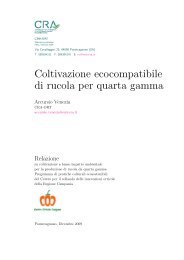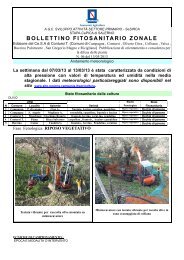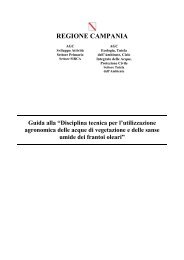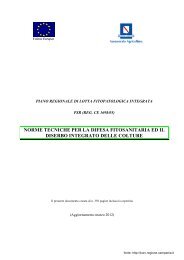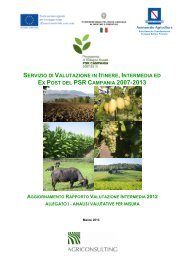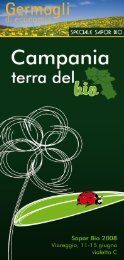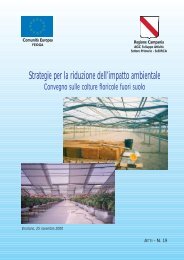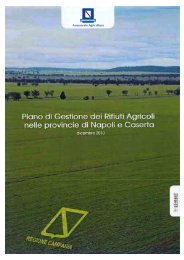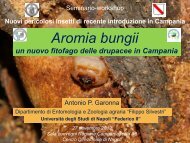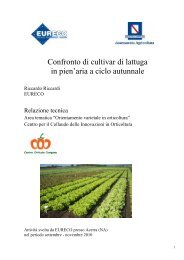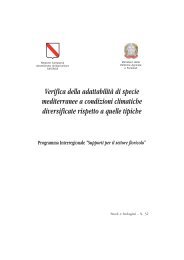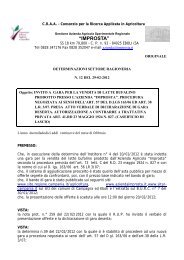Centro Orticolo Campano - Regione Campania
Centro Orticolo Campano - Regione Campania
Centro Orticolo Campano - Regione Campania
Create successful ePaper yourself
Turn your PDF publications into a flip-book with our unique Google optimized e-Paper software.
verno, appesi in luoghi semiombreggiati e ben<br />
ventilati.<br />
Oggi l’aumento della domanda di Pomodoro<br />
Corbarino ed il crescente interesse da parte<br />
delle industrie di trasformazione locali, hanno<br />
determinato uno sviluppo delle coltivazioni<br />
anche in aree di pianura, sebbene questo ortaggio<br />
esprima le migliori caratteristiche nelle produzioni<br />
delle zone collinari, dove le elevate<br />
escursioni termiche favoriscono il vivo arrossamento<br />
e la coltivazione in asciutta conferisce<br />
consistenza e sapidità.<br />
Il prodotto trasformato (in barattoli di vetro o<br />
di latta) è rappresentato dai pomodorini interi,<br />
non pelati, immersi in succo ricavato generalmente<br />
dagli stessi pomodorini.<br />
Esso è particolarmente adatto per preparare,<br />
anche in inverno, gustose pietanze tipiche a<br />
base di pomodoro.<br />
Una curiosità: tipico piatto della gastronomia<br />
partenopea è il sugo con le “vongole fujute”<br />
che pur non prevedendo tra gli ingredienti l’utilizzo<br />
delle vongole, ha un profumo inconfondibile<br />
di mare.<br />
Il segreto è proprio nel Pomodorino di Corbara,<br />
che ha la caratteristica unica di assorbire l’aspro<br />
salmastro del mare e di conferire ai sughi<br />
l’aroma penetrante dei frutti di mare, anche se<br />
non ci sono.<br />
eaten fresh or to be canned by<br />
hand. According to a traditional<br />
system, little branches of<br />
tomatoes are woven, forming big<br />
“piennoli”, that have to be stored<br />
during the winter: they are hang<br />
up in shady and well-aired<br />
places. Nowadays, increase in<br />
demand of “pomodoro<br />
corbarino”, and growing interest<br />
by the local canning industry,<br />
have boosted cultivation, which<br />
has spread from the hillsides to<br />
flat land, even if pomodori<br />
corbarini fully express themselves<br />
when they grow on the hills<br />
(mainly because of the wider<br />
range of temperature, providing<br />
them with their peculiar red<br />
colour). Whole and unpeeled<br />
tomatoes are dipped into their<br />
own juice and canned in glass or<br />
tin. They are especially suitable<br />
to prepare delicious dishes based<br />
on pomodori even in winter.<br />
Pomodori corbarini are the main<br />
ingredient for the so called<br />
“vongole fujute” (escaped hen<br />
clams) sauce. This recipe is able<br />
to provide the sauce with a<br />
seafood aroma, even if hen clams<br />
are not featured at all! That<br />
depends on the pomodorini di<br />
corbara, which absorb the salty<br />
and bitter taste of the sea.<br />
17



